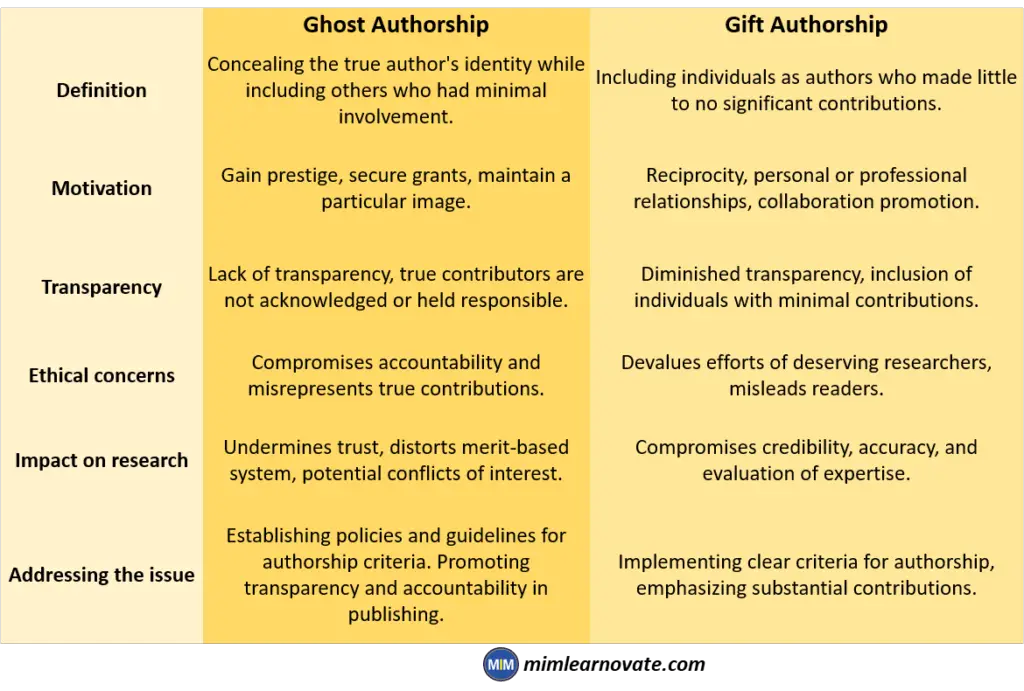In the world of academia and publication, authorship is considered a fundamental aspect that acknowledges the intellectual contributions of individuals.
However, certain practices like ghost authorship and gift authorship have drawn attention, challenging the integrity and transparency of academic work.
In this blog post, we will delve into the contrasting concepts of ghost authorship and gift authorship, exploring their differences, ethical implications, and impact on scholarly research.
What is Authorship?
Authorship is given to the person who made the most intellectual contribution to a publication.
This includes:
- Data collection, management, and interpretation;
- Study or project design
- Review of the written work with critical judgement
An author must constantly be prepared to declare that they are completely knowledgeable with the subject matter and methodology of the research, accepting responsibility for any incorrect or improper assertions made when doing the research or submitting the work for publication.
However, the reality is more complicated: it may be difficult to distinguish authorship from co-authorship and authorship from acknowledgment.
People’s roles in a research project can change significantly over the course of the process, making it challenging to gauge the level of contribution made by each individual and, as a result, to give them the credit they deserve.
The International Committee of Medical Journal Editors published a clear guide for authorship in scientific papers to reduce these kinds of issues, taking into account, for instance, short-term researchers who frequently don’t get enough recognition for their work.
Ghost Authorship
Ghost authorship refers to the practice of concealing the true identity of an author who has made substantial contributions to a manuscript or publication. In such cases, the individual responsible for the work is intentionally omitted from the list of authors, while other individuals who may have had minimal involvement are listed as authors.
Ghost authorship can occur for various reasons, such as when influential figures or supervisors wish to gain prestige, secure grants, or maintain a particular image.
This practice compromises the transparency and accountability of research, as it misrepresents the true contributions made by individuals involved.
Ghost authorship in research
Ghost authorship happens when someone who actively contributed to the research is not disclosed in the acknowledgements section or author byline.
This person could be a researcher with no relevant experience who assisted the main author in drafting and editing the manuscript. It could also be a junior colleague or researcher who assisted with the research and authored the first version of the manuscript.
Although this practice is rather unfair, one could always argue that because these individuals played a considerably more technical role and were completely under the main researcher’s control, they never really contributed much intellectually to the study.
Example of Ghost authorship
However, there is one type of ghost authorship that is widely seen as unethical, and the primary reason why the World Association of Medical Editors strongly opposes it.
There have been documented incidents of pharmaceutical ghost-written industry-sponsored trials.
Papers written by professionals in the pharmaceutical industry with the intention of marketing drugs among the medical industry.
Behind a listed author, who may not even be aware of what is happening under his name and whose reputation has been used to provide credibility to the paper, these ghost authors are hidden.
Readers mistakenly believe the paper is unbiased and adheres to academic good practice standards without being aware of any of this.
Ethical Implications of Ghost Authorship
Ghost authorship raises significant ethical concerns within the academic community. Firstly, it diminishes the principle of accountability, as the real contributors are not acknowledged or held responsible for the content they produce.
Additionally, it distorts the merit-based system by awarding authorship to those who may not have actively participated in the research process. This undermines the trust placed in scholarly publications, as readers rely on accurate authorship information to assess the credibility and expertise behind a piece of work.
Ghost authorship can also contribute to conflicts of interest, particularly when undisclosed funding sources or affiliations are involved.
Gift Authorship
In contrast to ghost authorship, gift authorship refers to the inclusion of individuals as authors who have made little to no significant contributions to the research or publication.
Gift authorship often occurs due to personal or professional relationships, where authors are added as a favor or as a means to promote collaboration.
This practice is prevalent in certain cultures or academic disciplines, where the emphasis on reciprocity and networking outweighs the importance of substantial intellectual contributions.
Gift Authorship in research
Gift authorship is when a person receives acknowledgement for writing a research paper while, in reality, making absolutely no contributions to it.
Unfortunately, most medical editors find this kind of unethical behavior to be completely unacceptable.
Example of Gift Authorship
Junior researchers could feel under pressure to provide authorship to senior colleagues because they believe it will increase their chances of publication and credibility. Senior authors may choose to award someone who has assisted them in the past or to gratify coworkers and collaborators in order to keep good relations with them.
Ethical Implications of Gift Authorship:
While gift authorship may seem harmless on the surface, it still raises ethical concerns within academic circles.
By including individuals who have not contributed significantly to the research process, the credibility and accuracy of the work can be compromised.
This can mislead readers and hinder the evaluation of an author’s true expertise and capabilities.
Moreover, gift authorship devalues the efforts of genuinely deserving researchers, potentially hindering their career progression and recognition within the scholarly community.
Addressing the Issues of Ghost Authorship and Gift Authorship
To combat these unethical practices, it is crucial for institutions, journals, and researchers themselves to promote transparency, accountability, and integrity in academic publishing.
Policies and guidelines should be established to ensure that authorship is assigned based on substantial contributions to the research process.
Clear criteria should be outlined to determine who qualifies as an author, considering factors such as conception, design, data analysis, and critical revisions.
Ghost Authorship vs. Gift Authorship

| Ghost Authorship | Gift Authorship | |
| Definition | Concealing the true author’s identity while including others who had minimal involvement. | Including individuals as authors who made little to no significant contributions. |
| Motivation | Gain prestige, secure grants, maintain a particular image. | Reciprocity, personal or professional relationships, collaboration promotion. |
| Transparency | Lack of transparency, true contributors are not acknowledged or held responsible. | Diminished transparency, inclusion of individuals with minimal contributions. |
| Ethical concerns | Compromises accountability and misrepresents true contributions. | Devalues efforts of deserving researchers, misleads readers. |
| Impact on research | Undermines trust, distorts merit-based system, potential conflicts of interest. | Compromises credibility, accuracy, and evaluation of expertise. |
| Addressing the issue | Establishing policies and guidelines for authorship criteria. Promoting transparency and accountability in publishing. | Implementing clear criteria for authorship, emphasizing substantial contributions. |
Why the Placement of Your Name on a Research Paper Matters?
Research papers may have a solo authorships or multiple authors. Supervisors from different departments who were not involved in gathering the research or writing the conclusions may occasionally be included as co-authors.
The academic culture’s pervasive ‘publish or perish’ stigma may put pressure on some scholars and researchers. You can agree to have your name added to a paper without making a meaningful contribution because you feel pressured to publish research articles frequently in order to attract funding.
The placement of your name on a research paper holds significant importance. It signifies your level of contribution, impacts your career progression, and influences your reputation and visibility within the scientific community.
Being listed as the first author showcases your independent research capabilities, while last authorship demonstrates seniority and expertise.
Properly attributing authorship ensures transparency and fosters a culture of integrity. Understanding the implications of authorship order allows researchers to navigate the academic landscape strategically and ethically, promoting collaboration and recognition in the scientific community.
Conclusion
Ghost authorship and gift authorship represent two distinct practices that undermine the integrity and transparency of academic publishing.
Both practices compromise the credibility of research and the recognition of deserving contributors.
By addressing these issues and promoting ethical authorship practices, we can foster an environment where the intellectual contributions of researchers are rightfully acknowledged, leading to a more trustworthy and reliable body of scholarly work.
Other articles
Please read through some of our other articles with examples and explanations if you’d like to learn more about research methodology.
Comparision
- Basic and Applied Research
- Cross-Sectional vs Longitudinal Studies
- Survey vs Questionnaire
- Open Ended vs Closed Ended Questions
- Experimental and Non-Experimental Research
- Inductive vs Deductive Approach
- Null and Alternative Hypothesis
- Reliability vs Validity
- Population vs Sample
- Conceptual Framework and Theoretical Framework
- Bibliography and Reference
- Stratified vs Cluster Sampling
- Sampling Error vs Sampling Bias
- Internal Validity vs External Validity
- Full-Scale, Laboratory-Scale and Pilot-Scale Studies
- Plagiarism and Paraphrasing
- Research Methodology Vs. Research Method
- Mediator and Moderator
Comparision
- Independent vs. Dependent Variable – MIM Learnovate
- Research Article and Research Paper
- Proposition and Hypothesis
- Principal Component Analysis and Partial Least Squares
- Academic Research vs Industry Research
- Clinical Research vs Lab Research
- Research Lab and Hospital Lab
- Thesis Statement and Research Question
- Quantitative Researchers vs. Quantitative Traders
- Premise, Hypothesis and Supposition
- Survey Vs Experiment
- Hypothesis and Theory
- Independent vs. Dependent Variable
- APA vs. MLA
- Ghost Authorship vs. Gift Authorship
Research
- Research Methods
- Quantitative Research
- Qualitative Research
- Case Study Research
- Survey Research
- Conclusive Research
- Descriptive Research
- Cross-Sectional Research
- Theoretical Framework
- Conceptual Framework
- Triangulation
- Grounded Theory
- Quasi-Experimental Design
- Mixed Method
- Correlational Research
- Randomized Controlled Trial
- Stratified Sampling
- Ethnography
- Ghost Authorship
- Secondary Data Collection
- Primary Data Collection
- Ex-Post-Facto
Research
- Table of Contents
- Dissertation Topic
- Synopsis
- Thesis Statement
- Research Proposal
- Research Questions
- Research Problem
- Research Gap
- Types of Research Gaps
- Variables
- Operationalization of Variables
- Literature Review
- Research Hypothesis
- Questionnaire
- Abstract
- Validity
- Reliability
- Measurement of Scale
- Sampling Techniques
- Acknowledgements
Statistics



